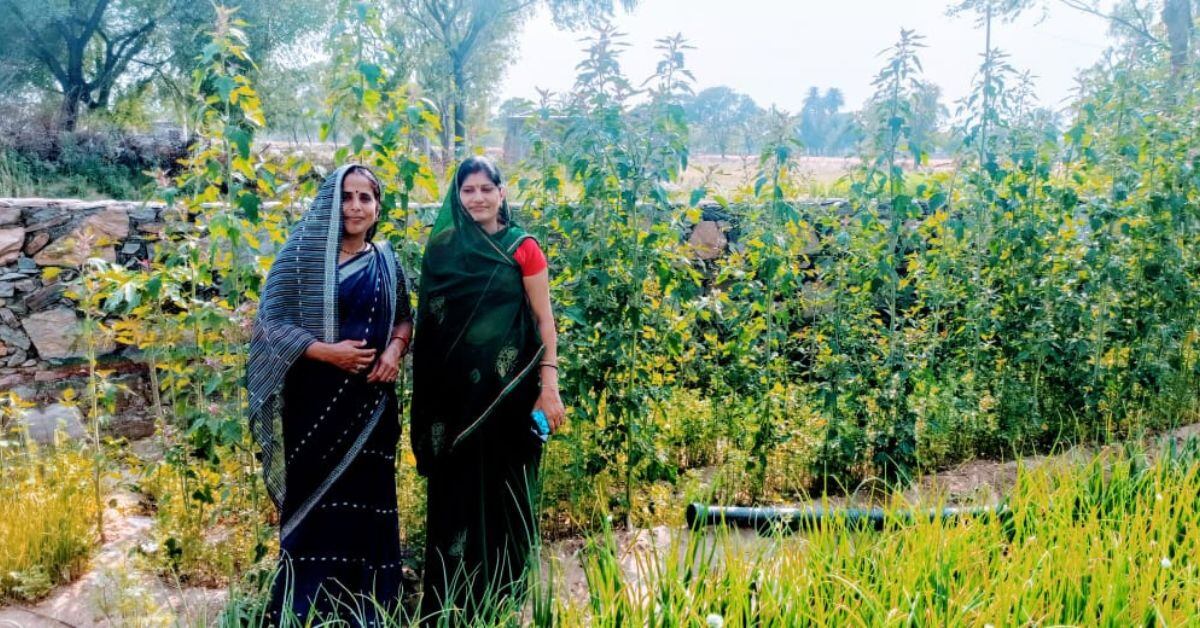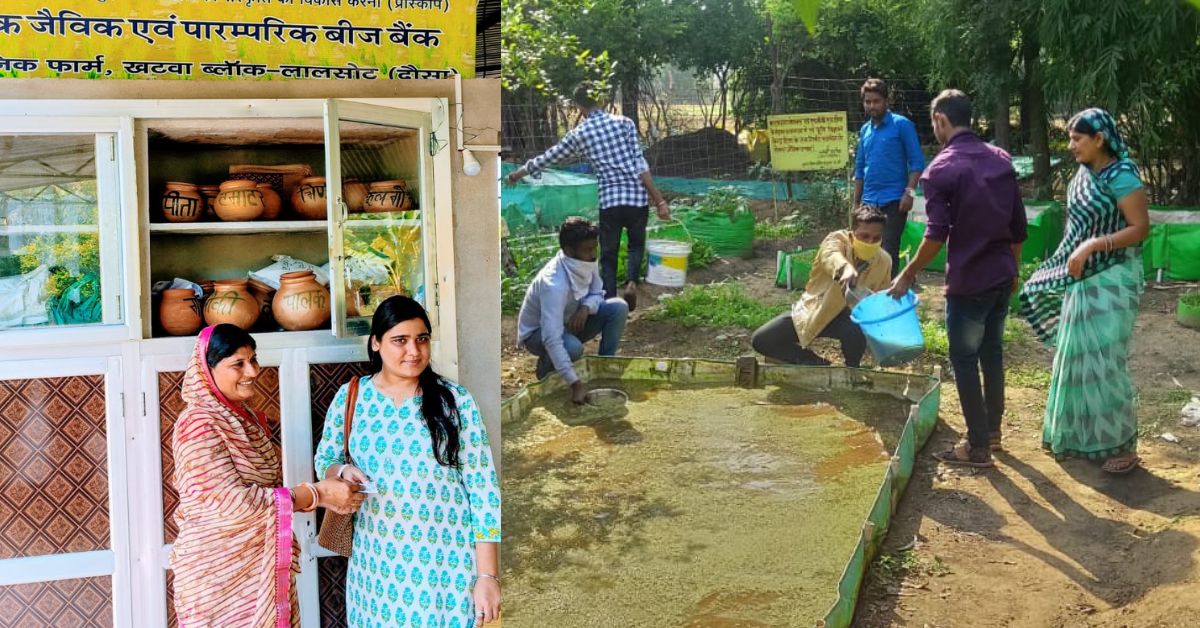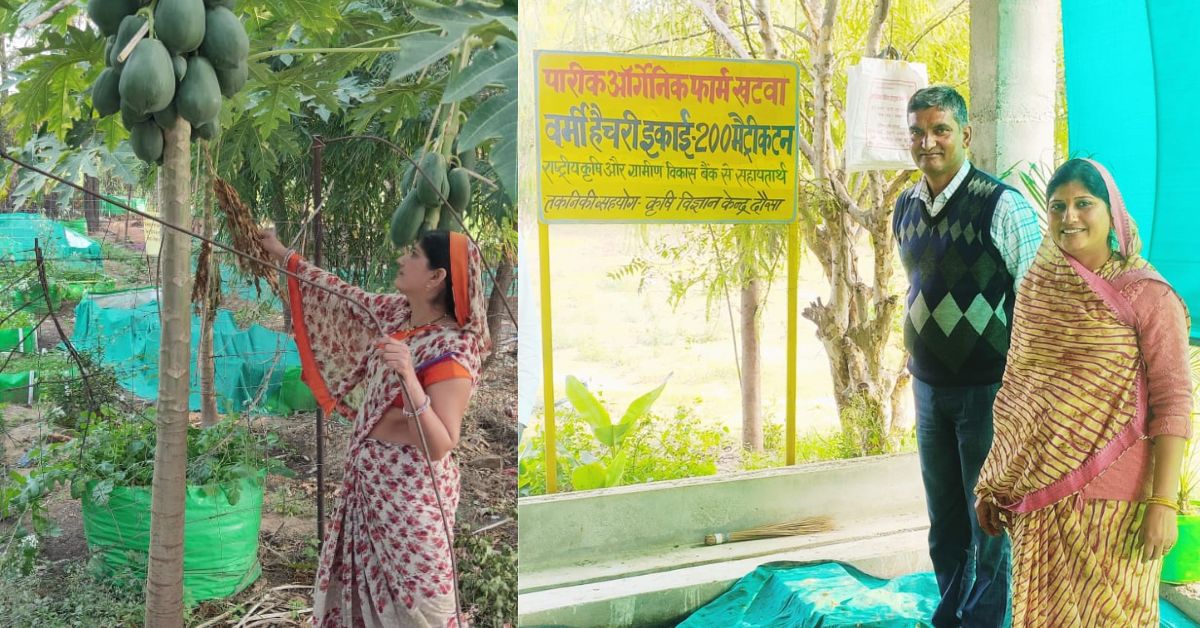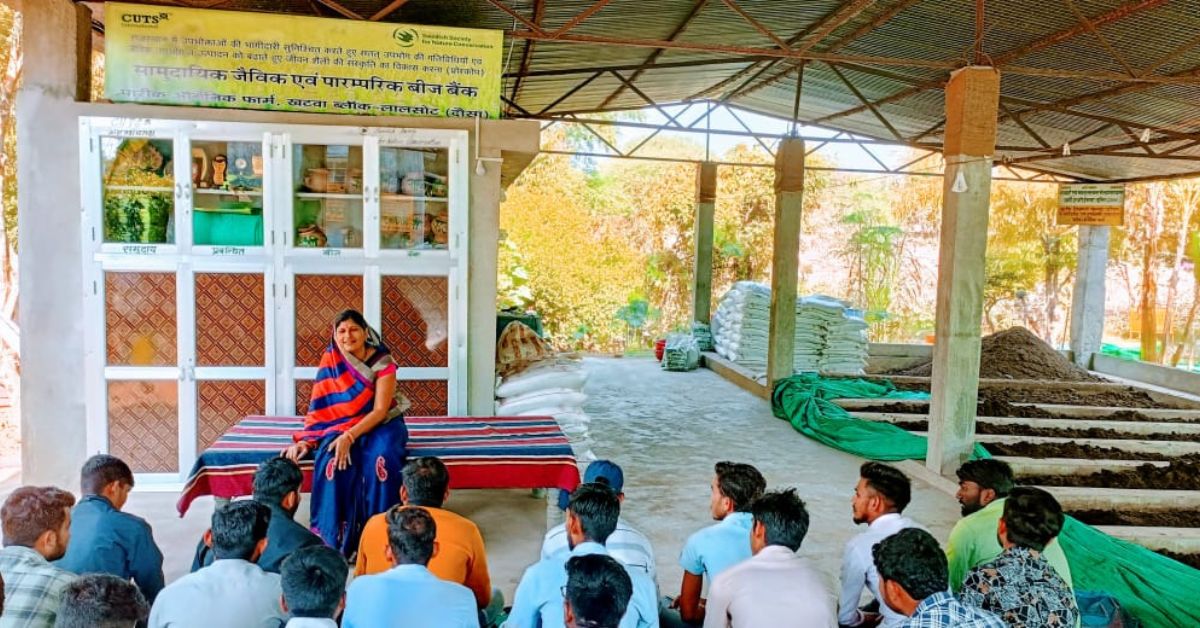Raised by her widowed mother with five other siblings, Rubi Pareek had a difficult childhood. At the very young age of one, she had lost her father to cancer. Often, the family would not have money to buy vegetables and would be left to depend on dry chapatis (flatbreads) and chutneys.
“We had 150 bigha land but our family had to sell most of our property and all our savings on my father’s treatment. We were told that it was because of pesticide-laden vegetables that the risk of life-threatening diseases like cancer increased,” Rubi tells The Better India.
“After my father’s death, we struggled for even a penny. I am from a conservative society where women are not allowed to step out of homes to work. So, my mother raised her five children with whatever savings we were left with,” adds the 39-year-old.
Amid the financial hardships, the Dausa resident could not study after class 10. At the age of 20, she was married into an agricultural family where she found a sense of empowerment. Not only this, she helped her family convert nearly 26 acres of land into a profitable organic farm.

Saved 50% input costs & doubled the income
In 2006, Rubi narrates, a team from the local Krishi Vigyan Kendra (KVK) organised a workshop on various wheat varieties on her family’s farm. Out of curiosity, she asked the officials if there was an alternative to chemical-based farming.
“I always wondered why cases of diseases like cancer keep rising. The officials were very impressed that a woman in the crowd had asked such a question. They explained the importance of organic farming and how the food produced organically is nutritious not only for humans but also for soil health,” she adds.
Soon after, Rubi joined a three-day training course at KVK and learned how to switch to organic farming. This proved to be a turning point for her family’s income.
Traditionally, the family had been cultivating wheat and mustard crops by infusing chemical fertilisers and pesticides which took a toll on the soil fertility of their farm. Without complete knowledge, they kept on adding fertilisers, which only worsened the crop yield rather than doing any good.
Rubi explains, “The usage of chemical fertilisers and insecticides has degraded the porosity and aeration of our farm soil. As a result, it would get difficult for us to plough the soil. Whereas organic fertilisers increase the soil porosity which aids root development of the crop.”

Other than increasing soil health, organic farming allowed the family to save high input costs on chemicals. “In place of urea, DAP, and other chemical fertilisers, we only use cow dung and vermicompost. This has saved us 50 percent on input costs. Additionally, our profits have doubled as organic produce is sold at twice the price because of high demand,” she adds. Rubi is now able to generate an income of Rs 1 lakh per bigha.
But it was not this easy for Rubi to bring home the bacon. Coming from a conservative background, Rubi was questioned for her capabilities. “When I told my in-laws that I wished to experiment with organic farming on our land, they would mock me. My father-in-law questioned what can I achieve by doing this,” she recalls.
However, with her husband’s support, she managed to start her experiment with one bigha land. Sadly, she could not get a good yield for the initial 2-3 years. “In the first year, our yield was very low comparatively. From one bigha land, we would get 12 quintals of wheat with the application of chemicals but with the organic fertiliser, we managed to just get roughly eight quintals,” she says.
Determined irrespective of low profits, Rubi continued to farm organically and utilised composts like jeevamrut (a liquid organic fertiliser made from cow dung and urine), cow dung, and vermicompost. “I was aware that initially, we won’t get good produce as it takes time to heal the soil,” she adds.
After four years of toiling, Rubi started getting good produce that fetched her a double income. Today, she has been able to convert the entire 26-acre family farmland into a profitable organic farm.

Tutoring 15,000 farmers for free
Other than wheat and mustard, Rubi grows vegetables and fruits like amla (gooseberry), papaya, and lemon. For this, the couple has also set up a seed bank comprising 50 varieties of indigenous seeds of vegetables like okra, cowpeas, bottle gourd, bitter gourd, chillies, and more.
Rubi’s husband, Om Prakash, tells The Better India, “We have innovated a three-layer approach to grow vegetables that utilises extra space in the farm. We grow plants like lemon and karonda (blackcurrants) in the outermost layer. In the second layer, we grow shorter plants like aloe vera that are grown under the shade of these trees. In the third layer, we grow tall trees like papaya, bel (stone apple), and amla.”
“At one place, we have planted three kinds of plants. We did this so that farmers understood they could generate additional income from the same land. Kam lagat me adhik upaj, adhik upaj ka adhik munafa (More produce at less input costs which in turn gets more profits),” adds the 47-year-old.

Over the years, Rubi has also trained at least 15,000 farmers and agriculture students from across Rajasthan for free and helped them switch to organic farming. In order to help these farmers sell their organic produce, she also set up a farmer-producer organisation – Khatwa Kisan Jaivik Producer Company – that today has a network of about 15,000 farmers. The couple helps them sell the produce to officials in districts like Dausa, Jaipur, Madhopur, and Gangapur.
For her work towards promoting organic farming, Rubi was awarded by NABARD in 2008 and recently the Jaivik India Awards 2023 by the International Competence Centre for Organic Agriculture.
More than Rubi, her husband is more proud of her work. Om Prakash says, “A family is empowered only when its women are. I take pride that my wife has not only made our family land profitable but also that of thousands of farmers.”
Meanwhile, Rubi feels confident that she has been able to build an identity for herself. “I had always wanted to work in an area where no one in my family gets sick because of chemical-laden food. But I always wondered what a 10th pass woman is capable of doing in today’s world. Organic farming has given me a purpose to contribute towards building a swasthya samaj (healthy society),” she says.
Edited by Padmashree Pande. All photos: Om Prakash Pareek.
No comments:
Post a Comment